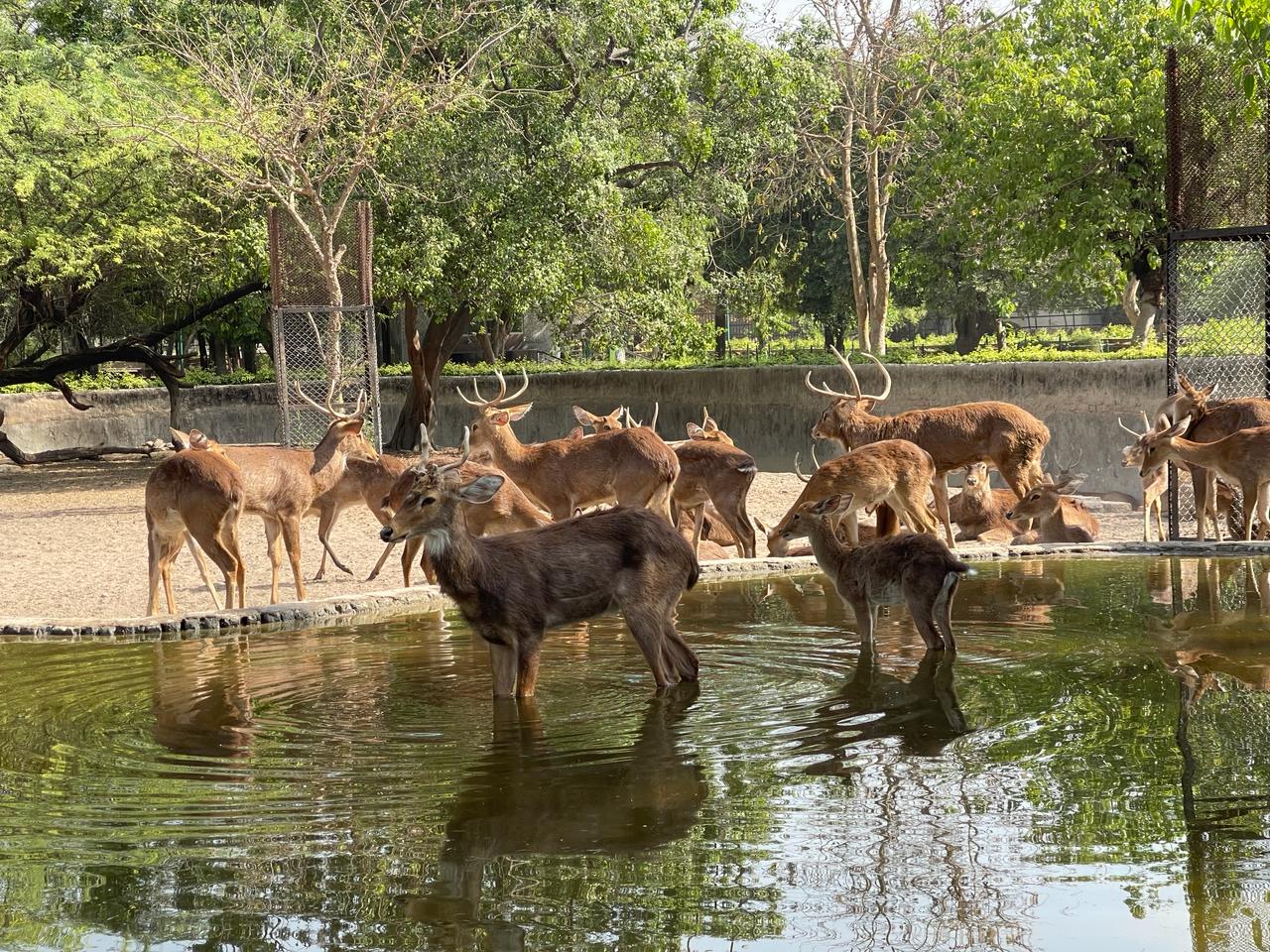
ESCAPING THE SUN: Sambar deer use the pool to beat the heat
With the mercury set to cross 36 degrees Celsius, citizens in Delhi have already started dealing with high electricity bills as air-conditioned rooms claim their half of the game yet again.
The animal kingdom is also not far behind.
Animals at Delhi’s National Zoological Park have been geared up to fend off the heat, with a wide range of preparations including multiple dietary upgrades and changes in living conditions.
The upgrades haven’t just happened in a fortnight. Rather it has taken the national capital’s primary zoo months of preparation to provide the sheltered wild animals with a dose of armaments to ward off the high temperature.
From coolers to personalised sprinklers, the animals are in for a treat this summer.
“Almost all the enclosures have sprinklers. Apart from sprinklers, some animals which need more consistent cooling, have been provided with coolers,” said Sanjeet Kumar, the Director of the zoo in the national capital.
He also added that most of the animals have been provided accessories according to their needs. For example, pools have been added to certain enclosures to help them cool off. Presently, the zoo authorities have developed multiple temporary straw huts to provide animals with efficient shade.
According to an officer with the Forest Range, sprinklers which wet the surroundings and cool them, have been set up and they function according to the temperature needs of the enclosures. The sprinklers are handled by the animal keeper, who controls the functions manually. On the other hand, animals like Sambar deer have had their sprinklers modified to suit their needs whereupon the height has been increased.
“In an incident earlier, a Sambar deer got its antlers stuck in the sprinkler’s knob which led to it getting torn apart as the deer wiggled free. This is a common occurrence especially now, during the mating season,” added the officer.
“We will be setting up a couple of temporary shelters for the animals where they will be able to go and sit whenever they want to take respite from the harsh heat. It should be completed this week. This will be done across the board for all animals,” Kumar said.
He further explained that to increase the tree cover in enclosures, certain tree species were being replaced by “more aesthetic” and “wider” trees.
“We are replacing the trees that we have here with Pilkhan, Banyan and Neem trees to provide the animals with larger spaces to enjoy the shade while looking pretty,” he said.
Furthermore, to help the animals with their dietary changes, the zoo’s management team has initiated a gradual shift to more seasonal food for both herbivores and carnivores.
“We have now started giving elephants kheer, which has replaced their intake of sugarcane in the winters. On the other hand, we have also started giving bears their share of seasonal fruits such as watermelon,” said the Forest Range Officer.
The Zoo Director also added that the animals are provided with stress relieving supplements to help them keep their anxiety in check because of the rising mercury.
Watermelons or other such seasonal fruits arrived on the platter with a certain twist to the tale. Much like the management provides ice blocks to the bears in their pools, it also provides them with ‘fruit balls’.
“We freeze the fruits in the form of balls which helps the bears and other animals lick at them like ice-creams. It helps in cooling the animals down,” added Kumar.
Presently, the zoo is looking to fit thermometres inside the retreating cells of the animals to better understand the living conditions.
“The temperature between 30 to 35 degrees Celsius is optimal. Anything more than 38 degrees is a major cause for worry and we want to track that,” said the Director.
The zoo authorities are also exploring options to get more “attractive” animals such as giraffes, zebras and chimpanzees for exhibition.
Delhi hosted what organisers describe as the world’s first player auction in golf, launching ‘72…
An elderly woman recalls how her six-year-old granddaughter lay bleeding after a speeding car hit…
Municipal Corporation of Delhi plans a unified policy enabling RWAs to adopt and maintain parks…
A 17-year-old boy allegedly died by suicide after jumping before a moving train at Uttam…
Delhi High Court grants bail to 26-year-old Thar driver accused of mowing down two in…
Two Rohini men arrested for fatally stabbing one person and injuring another during a robbery…